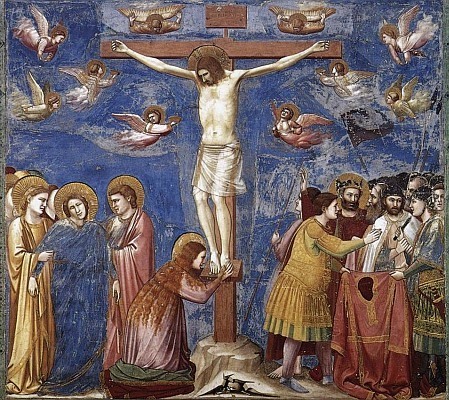The law of prayer is the law of belief. What we pray at the Holy Sacrifice of the Mass is just as important as how we pray it.
Total Pageviews
Friday, April 22, 2011
It is consummated
Today, the Church marks Good Friday. According to the Church's ancient tradition, the Holy Sacrifice of the Mass is not celebrated on this day. Instead, the Church commemorates the Passion of her Lord.
In the Memorial of the Roman Canon, we call to mind the various sacrifices made throughout the history of Ancient Israel. We recall the sacrifice of Abel and the "bread and wine offered by your priest Melchisedek". There is also another sacrifice that we recall, that of Abraham.
In Genesis, we note that God entered into a covenant with Abraham. Abraham cuts up several animals in two. The ancient practice of the covenant was that both parties would walk in between the split carcasses and pledge that if either of them breaks the covenant, their fate would be similar to the dead animals. God, knowing full well the frailty of human nature, causes Abraham to fall into a deep sleep. When Abraham regains consciousness, he sees a flaming brazier moving between the carcasses.
Later on, Abraham, who is already well past 100, faces perhaps the most important test of his faith. God asks him to sacrifice his beloved son, the child of the covenant, the heir who is supposed to make him the father of many nations. Abraham and Isaac make the trek up Mount Moriah. Isaac carries the wood up the mount. Such a heavy load would have been too much for the aged Abraham to bear. A prelate friend of mine notes that Rabbinic scholars believe that Isaac must have been a young man by this time. This may very well be the case, which makes the story all the more remarkable. At this point, Isaac has not married, let alone, sired any children. However, even though God asked Abraham to do the unthinkable and offer his beloved Isaac as a holocaust offering, Abraham had the faith to believe that God would restore this child of the promise back to him. Isaac, for his part, had to have faith, as well, since he submitted himself to whatever his father requested.
As Abraham prepares to sacrifice Isaac, God sends an angel to stop the patriarch. He sees Abraham's faith and credits it to him as an act of righteousness. Isaac is spared. In his place, father and son offer a ram which they saw caught in the thickets.
Generations later, we see the fulfillment of Abraham's sacrifice. The Old Testament foreshadows what will be fulfilled in the New Testament. In this case, the eternal Beloved Son of the Father is the one who is offered as the supreme sacrifice of the new and everlasting covenant. The Father asks his son, Jesus, to lay down His life in holocaust. Out of His immense love for the Father, Jesus willingly accepts death on a cross. Like Isaac, who prefigured Him, Jesus carries the wood, this time, that of the Cross, up Mount Calvary. The fire that was meant to consume Isaac becomes, in Christ, the fire of divine love, an intense love that compels Him to perfectly fulfill the Father's will.
But, there is another element here. If Abraham had complete trust in God, how much more did the Blessed Mother trust in the Lord, especially at the moment when all seemed lost. She united herself to her Son's saving ministry when she gave the Archangel Gabriel her fiat to become the Mother of God. "I am the handmaid of the Lord" she said. "Be it done unto me according to your will." This acceptance was not merely about agreeing to bear the Christ child. It was a commitment to be with Jesus through the end. Mary held on, staying with her Son, walking alongside of Him as he carried that wood up the mount. Like Abraham, Mary did not withhold her Son, the true Child of the promise, from God. Through her prayers, she united herself to Jesus, believing that whatever God promised would be fulfilled.
When Jesus says, "It is consummated", I believe that he does not just speak about his ministry. What he has consummated is the fulfillment of all of the sacrifices of Ancient Israel, from Abel, to Melchisedek, to Abraham, to Moses and to David. What he has consummated is the act of undoing the damage caused when Adam and Eve said "No". Jesus' perfect obedience, prefigured by the obedience of Isaac, brings forth salvation.
Isaac prefigured the sacrifice. Isaiah foretold the suffering of the servant. Jesus consummated all of this, perfectly fulfilling what had been foretold.
Subscribe to:
Post Comments (Atom)

No comments:
Post a Comment